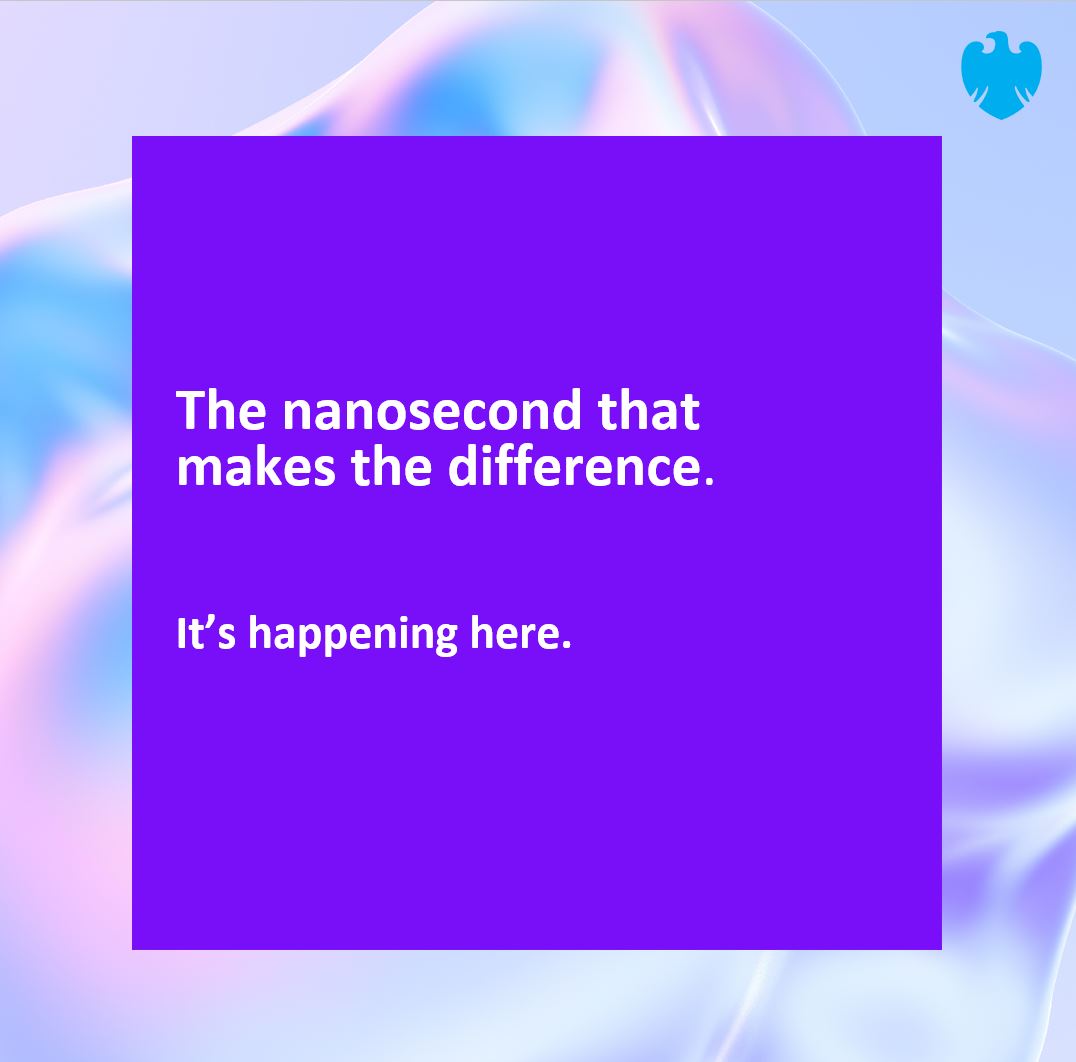In the Markets teams at Barclays, success is measured by the largest and smallest of margins. Billions of dollars. Millions of transactions. Hundreds of millions of datapoints. And, crucially, the nanoseconds it takes our systems to complete a trade. Because our competitive advantage relies on our ability to help clients seize their moment and make their transactions in the lightning quick time it takes for the markets to move.
Consider a FX client who wants to switch $50m into Euros. If a trade is delayed and the price of the Euro against the US Dollar increases by 0.001%, the buyer loses $50,000. Now consider all the things that can trigger that tiny price adjustment. Other trading in the same market. The strength of trading in other currencies, commodities, securities and investment vehicles. Macroeconomic factors like interest rates and national debt. Financial reports from major corporations. News reports and world events. All of these dynamics, across hundreds of inter-related markets, can affect a single trading position.
When I was at the start of my career, I wanted lots of interesting tech challenges and lots of interesting business problems. And I wanted my work to be a core part of the business. I found it all in the financial industry.
Eric Anderson, MD CIO Markets Tech
Interpreting millions of datapoints
Which makes this the perfect playground for tech people who want to challenge themselves and work at the edge what’s possible. The tech teams in Markets bring all these datapoints together and help our traders to make sense of them; seeking out the hard-to-decipher signals that turn data into insight and insight into action. And then, when a trade is made, it’s our technology that gets it to one of the major exchanges ahead of the competition.
The importance of accuracy at speed
At the simplest level, an exchange like the NASDAQ, the London Stock Exchange or the Deutsche Borse, is just a meeting place where an order to buy meets an offer to sell. When the prices match the trade is made. And if several people are offering the same deal, priority goes to the people who got in first.
This creates a race to be the fastest to act and react in the markets. Once upon a time, the exchanges on Wall Street ran on runners. They were the people who carried physical orders between a brokerage house and the exchange, often through underground tunnels. The same principle, of speed to market, still applies. But technology makes everything a lot faster.
In computing, the delay between the command to transfer data and the start of the actual data transfer is called latency. And we measure it in nanoseconds. But that speed doesn’t just come from our networks. We work in a heavily regulated industry. And all those regulatory checks need to be made, on all those millions of trades, before they enter the market. Some of the finest tech minds on the planet are working tirelessly to build systems that can make the checks, manage risk and seal the deal faster and faster again.
Increasing speed is half software and half hardware. You need faster tech and better coding. You want everything in memory, and you need to reduce the various hops in the journey.
Karen Ho, Director, Markets Technology
Calculating risk
Meanwhile, we manage the risk on our own positions by exploring every possible outcome for our investments, over and over again. These Monte Carlo algorithms run thousands of simulations, factoring in millions of variables. Imagining every scenario and testing every possibility, they explore the best of all worlds, and the worst, to accurately reflect the probabilistic nature of our risk.
Technology across markets
In fact, everything in Markets relies on technology. Every trade, every decision, every outcome requires technology. Many of traditional trading roles have been replaced with sophisticated algorithms. And even when traders are talking to customers direct by phone, they are using advanced trading systems to price and risk a potential deal.
That’s where Karen Ho comes in. An MIT graduate with 25 years’ experience in technology and finance, Karen joined as Director of Markets Technology in 2019.
“Soon after I joined Barclays, COVID hit the news, and so it’s been a very exciting few years. When I spoke to Barclays about coming on board, it was a really inspirational process. The sense of momentum and opportunity was palpable. Everyone was aligned around building a world-class franchise. The people were in place to build something special, but the tech needed to keep up.”
Straight away, Karen started work on building the next-generation credit desktop. Historically, different types of market information were held in separate pockets of data on discrete systems. That meant traders had to do a lot of manual work and cross-checking to track a client quote across multiple desktop displays. Karen and her team started working with the Credit business to create a fully data-driven platform using the very latest technology.
“We collaborated with the Credit business and together pitched the story to Mark Ashton Rigby (Barclays Group COO) and got the £35 million funding for the platform.”
A single unified platform, with a broad selection of widgets, the desktop allows users to slice and dice the vast amounts of data available to deliver the analysis that they need, and the insight that clients demand. As someone who actually worked as a trader for two years, Karen can empathise with the people her teams work to support.
We work closely with Product teams to ensure that we’re meeting the real demands of our colleagues and our clients. It’s vital to have that on-going conversation – to understand, from both sides, why a feature is important. Because whether you’re working on a trading desk or coding the platform that underpins that desk, you have to know exactly why you’re doing what you’re doing. Precision matters. Excellence matters.
Karen Ho, Director, Markets Technology
The unified approach that’s vital to the new credit desktop forms part of a larger One Markets philosophy led by Karen’s boss, Eric Anderson, the MD CIO, Markets Technology. The tech needs behind every trading desk come down to three very similar flows: market-making, execution and client flows. Despite this, the tradition in other banks has always been for the tech across different trading desks to be separate and siloed, developing at different rates. Anderson has created a culture of shared goals and collaboration across Markets Tech.
“My counterparts across FX, equities, we know each other really well. We know each other books of work. That is unheard of in other banks.” says Karen.
This transparency and togetherness helps the teams create strong unified tech platforms, that can offer customised apps to meet the specific needs of different trading desks. “We’re building for the long term, working with the latest tech and putting things into production through Agile sprints every two weeks.”
We’re all engineers. We love to build and fix things. We love solving problems together. Even Eric, with a global team to look after, gets personally involved in finding solutions. He’s still got that hunger and energy. It’s really motivating. And we work with all our teams the same way.
Karen Ho, Director, Markets Technology
Perhaps that drive to fix things is why the next-generation credit desktop is not even project Karen is most proud of. “It’s less glamourous, but when I arrived the Rates platform was the noisiest app in Markets.” Her team implemented 500 different changes and, crucially, aligned people to key roles in looking after the platform. “The transformation has been hugely satisfying – because I was able to lead the team into something new and everyone really stepped up.”
With all this going on, Karen still likes to code. To tinker and engineer solutions to even the thorniest problems. “This is embarrassing. The last thing I built was a random generator app to help my family decide what take-out we should order. You never stop being an engineer at heart.”
And that’s why she loves her job. “Barclays has completely lived up to the hype. Everything I’ve done in the last 25 years of my career, from being a trader to building a fintech start-up, I’ve used it in some way over the last two years.”
The challenges facing tech people in Markets
Providing the data that drives decision-making, placing orders, reporting to regulators and resolving millions of financial positions in the blink of an eye creates huge and fascinating tech problems.
Should we move data to the Cloud, keep it close to the exchange or build containers that float in between? How do we manage the scale of information we receive and process? How do we democratise that data, arming traders and clients with the tools they need to create their own algorithms and analysis? How do we crunch the biggest numbers in the shortest time with the least computing power?
And how do you make sure everything keeps working 24/7, 365 days a year? When something goes wrong with the everyday processes at a big tech firm it can make the news. But you can reset the system, refresh the browser and the worse that will happen is that someone has to re-post their latest picture of a dog wearing a hat. But you can’t just re-boot a system that’s carrying trades worth $billlions.
The vital role of Markets and tech in Markets
All these challenges put tech people at the heart of the Markets business. That means influencing the entire world of finance. Providing the investment behind innovation. Funding infrastructure projects that build roads, bridges and hospitals. Driving sustainable investment decisions. And touching the lives of billions of people. It’s happening here.
We raise money for companies. We raise money for governments. We raise money for the World Bank. We raise money for the IMF. The finance we provide is the oxygen that makes the world work. What we do is inherently good for society. That’s our purpose.
Richard Cunningham, Chairman of Markets and Global Head of Senior Relationship Management.



